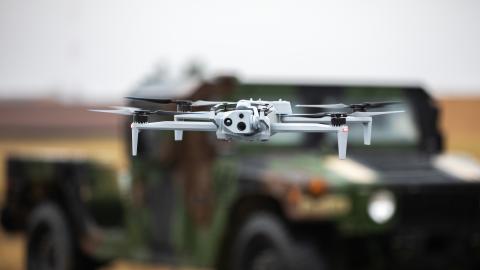One of the top foreign policy challenges facing the next administration of President Donald Trump will be the ongoing war between Russia and Ukraine.
When Trump enters the Oval Office on Jan. 20, Russia’s invasion of Ukraine will be nearing its third anniversary. Speculation abounds about how Trump will approach this conflict, but it seems clear that he genuinely desires a peaceful resolution.
Achieving this, however, will be no easy task. For peace to endure, Ukrainians — who are the victims in this war — must feel that any negotiated settlement is fair and just. Additionally, they will need assurance of future security.
Leading up to the US presidential election, many expressed concerns about how a Trump victory might affect Ukraine. Would he withdraw US support? However, since his historic victory last month, the world is beginning to see how he might approach the issue. Early indications suggest that Ukrainians have reason to be cautiously optimistic.
Trump will want to avoid appearing weak. Any resolution that leaves Russia looking victorious and Ukraine defeated would undermine America’s global image. Avoiding a geopolitical disaster akin to the chaotic withdrawal from Afghanistan will likely be a priority for his administration.
Moreover, Trump’s innate desire to be seen as a winner will compel him to secure a deal perceived as favorable to both Ukraine and US interests. Among America’s partners in Europe, the Middle East, and East Asia, abandoning Ukraine would be seen as a failure — a perception Trump is unlikely to tolerate.
Trump’s appointments to key national security positions bode well for Ukraine. While the nomination of former Congresswoman Tulsi Gabbard as director of National Intelligence has sparked controversy, the rest of his team appears solid.
His nominee for secretary of state, Sen. Marco Rubio, has a strong understanding of the Ukraine conflict and has consistently supported US engagement in the region. Similarly, National Security Adviser-designate Mike Waltz has shown a commitment to robust American leadership and understands the threats posed by Russia.
Retired Gen. Keith Kellogg, who will serve as Trump’s special envoy for Russia and Ukraine, brings credibility and strategic insight to the table. Notably, Kellogg has publicly endorsed Ukraine’s use of long-range American missiles, arguing this provides Trump with greater leverage in future negotiations.
Recent engagements between Trump and Ukraine’s President Volodymyr Zelensky offer further hope. The two met in person during the height of the US presidential campaign in September, with reports indicating a productive discussion.
This meeting seemed to influence Trump’s rhetoric, which shifted to a more positive tone regarding Ukraine. Since the election, Trump and Zelensky have spoken by phone, and top Ukrainian advisers have visited Mar-a-Lago for further discussions.
Additionally, at the reopening of the Notre Dame Cathedral in Paris, French President Emmanuel Macron hosted a trilateral meeting with Trump and Zelensky. Such sustained engagement suggests a serious intent to address the conflict responsibly.
Trump’s track record on major foreign policy issues also indicates he will approach the Ukraine situation with deliberation. During his first presidential campaign in 2016 his top foreign policy pledge was to withdraw from the Joint Comprehensive Plan of Action, also known as the Iran nuclear deal.
However, after entering office in January of 2017 it was not until May of 2018, about one-third of the way through his first term, that he finally took America out of the deal. And he did so only after a very detailed and months-long interagency review across the US government that resulted in the maximum-pressure campaign against Iran after leaving the deal.
One might agree or disagree on whether leaving the deal was sensible or whether the maximum-pressure campaign was the right strategy but nobody can argue that Trump rushed the decision with little or no thought. Therefore, there is reason to believe that he will approach the situation in Ukraine with the same level of diligence.
A recent poll shows that almost half of Ukrainians now have trust in Trump, up from only 10 percent in 2023. This reflects widespread frustration with the Biden administration’s approach to the conflict. While Ukrainians appreciated the outgoing administration’s initial support in the early days of the war, many feel its risk-averse strategy — delivering just enough aid for Ukraine to survive but not enough to win — has prolonged the conflict.
After nearly three years of stalled progress, many Ukrainians are open to seeing if Trump can deliver a secure, just, and lasting peace.
That said, Trump will face competing priorities upon taking office, many of which will involve domestic politics. At the top of the list will be securing the southern border and boosting the economy. While his national security team appears well-equipped to deal with any peace talks, there will undoubtedly be voices within the administration downplaying Ukraine’s importance.
Trump must resist these pressures and focus on achieving a fair and just resolution to the war that guarantees Ukraine’s security. Doing so would not only align with America’s national interests but also cement Trump’s legacy as a global statesman — a goal he is likely keen to achieve.
With sound political appointments, positive engagement with Ukraine, and a history of methodical decision-making on foreign policy, Trump has the tools to address the Ukraine conflict effectively.
There is reason to believe he can help bring a just end to the war — an achievement that would benefit Ukraine, the US, and the international community as a whole.
Enjoyed this article? Subscribe to Hudson’s newsletters to stay up to date with our latest content.















